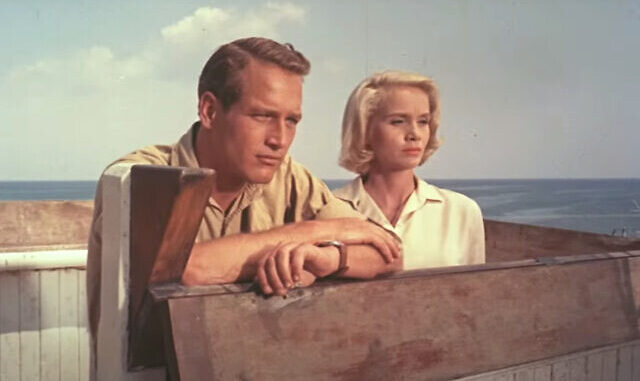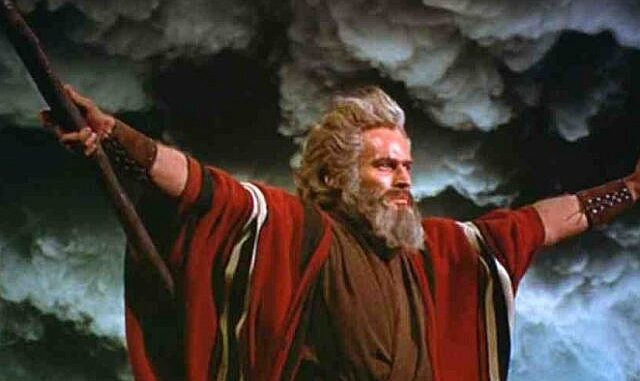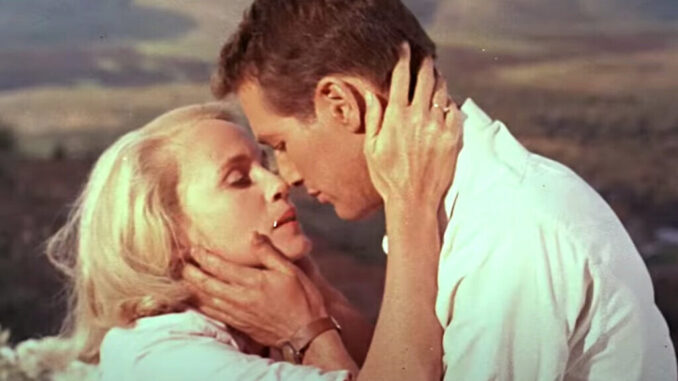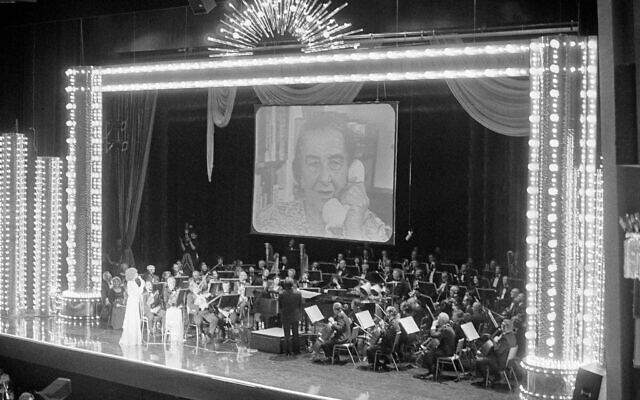In a new book, authors Tony Shaw and Giora Goodman examine the history of modern Israel’s representation in cinema — with all its ups and downs

Detail from photograph of Gal Gadot posing for Moses Pini Siluk as Wonder Woman for Israeli Sheva Leylot magazine years before snagging the role in the film. (Moses Pini Siluk)
Israel plays a larger-than-life role on America’s silver screen. From big-budget epics such as Paul Newman’s 1960 hit “Exodus” to Adam Sandler’s raunchy “You Don’t Mess With the Zohan” in 2008, Hollywood films about the Jewish state can evoke a cluster of competing reactions.
A new book takes in the panorama — “Hollywood and Israel: A History,” by professors Tony Shaw and Giora Goodman.
“There have been a few books dealing with the subject of the representation of Israel in Hollywood films, mainly ‘Exodus,’” Goodman said in a joint Zoom interview between the authors and The Times of Israel. “But none of them are about the relationship as a whole, both off-screen as well as on-screen, and over a whole century.
“It’s not just film production, but also philanthropy, diplomacy and celebrity advocacy, the whole kind of relationship that can be built between the global entertainment capital and a state, Israel.”
The book is replete with cinematic moments depicting Israel.
They range from the heartfelt kiss between Newman and his American Presbyterian lover, nurse Kitty Fremont (Eva Marie Saint), atop Mount Hermon in “Exodus,” to the heart-stopping sight of zombies swarming Jerusalem in “World War Z,” a Brad Pitt dramatization of the apocalyptic bestseller by Max Brooks, son of beloved Jewish director Mel.

Paul Newman and Eva Marie Saint in 1960’s ‘Exodus’ (screenshot)
There are also plenty of tidbits backed up by archival research. Did you know that former prime minister Ehud Olmert is credited with suggesting the title “Pretty Woman” to sabra producer Arnon Milchan back when Olmert was mayor of Jerusalem? Or that the 1990 Julia Roberts blockbuster then became Yasser Arafat’s favorite film? Or that lifelong Israel aficionado Frank Sinatra reportedly smuggled funds to the Haganah? (At least, that was the claim by Teddy Kollek, an early Israeli liaison to Hollywood who also became mayor of Jerusalem.)
The book has a near-Hollywood origin story: A Los Angeles-based colleague connected the geographically separated authors. Shaw is a British academic at the University of Hertfordshire, while Goodman is based in the Galilee as the Department of Multidisciplinary Studies chair at Kinneret College.
Asked about their favorite films among the many they surveyed, the authors were coy, although they gave two thumbs up to Sandler’s “Zohan.”
“I am not a big Adam Sandler fan,” Shaw said. “Most of his movies are cringe-bad. ‘Zohan’ is not a bad movie in terms of making you laugh. I’m not a teenager, Sandler is a massive hit for teenagers, it was not a great takeaway from the whole process, but I like to have a good laugh.”
The book’s cast of characters includes Jewish-American celebrities such as Barbra Streisand, who conversed with ex-prime minister Golda Meir by satellite and sang “Hatikvah” at a star-studded 30th birthday party for Israel on prime time in 1978.
Entertainer Barbra Streisand, lower left, talks with Israel’s prime minister Golda Meir by telephone during ‘The Stars Salute Israel at 30’ in Los Angeles, May 7, 1978. (AP Photo/Wally Fong)
And then there’s Steven Spielberg, who directed two somber Israel-connected films: the Oscar-winning 1993 “Schindler’s List,” which ends with Holocaust survivors headed for Zion accompanied by “Jerusalem of Gold,” and the controversial 2005 “Munich,” an exploration of the Mossad’s hunt for the Black September terrorists behind the 1972 Summer Olympics massacre of members of the Israeli Olympic team.
“[Munich] indicated, perhaps, doubts sown by some in Hollywood that they were beginning to have about Israel,” Shaw said. “It was seen as being very critical of Israeli anti-terrorism strategy, but it was designed by Steven Spielberg as a plea for peace.”
Within the book, Israelis like superstar Gal Gadot and director Gideon Raff reflect an increasing sabra pipeline to Hollywood. There are appearances by non-Jewish luminaries such as Sinatra, whose photo adorns the cover and who gave his name to a youth center in Nazareth and a student center at Hebrew University’s Mt. Scopus campus, which was tragically the site of a terrorist bombing in 2002. There’s even a celebrity clergy leader: “The Rabbi to the Stars,” Max Nussbaum, who presided over two celebrity conversions to Judaism — Elizabeth Taylor and Sammy Davis Jr.

Gal Gadot attends the premiere of ‘I Am the Night’ on January 24, 2019, in Los Angeles. (Richard Shotwell/Invision/AP)
Beginning in the 1920s and ’30s, the narrative examines a small but growing number of Hollywood films supporting Zionism and opposing Hitler. After Israel achieved independence, Christian-themed biblical epics such as “Ben Hur” became in vogue, although arguably the most famous biblical movie of them all was an Old Testament story — Cecil B. DeMille’s “The Ten Commandments” — filmed in Gamal Abdel Nasser’s Egypt. It was released in 1956, the year of the Suez Crisis, and Nasser’s government banned the film for its alleged pro-Hebrew, anti-Egyptian plot, one of many Arab boycotts against films or actors deemed favorable to their Zionist neighbor.

Charlton Heston as Moses in 1956’s Cecil B. DeMille epic, ‘The Ten Commandments’ (photo credit: Paramount pictures)
Although Jewish studio heads such as Louis B. Mayer were sometimes lukewarm in their Zionism, one group in nascent Israel’s camp was Hollywood progressives, according to the book, which credits them for the 1953 film “The Juggler.” Starring Kirk Douglas as a Holocaust survivor in Israel, “The Juggler” established a cinematic precedent, being both set in Israel and actually filmed there.
“Hollywood’s early interest in Israel was not just ethnic or religious because of the large number of Jews in the film industry,” Goodman said. “The liberals in Hollywood, often Jewish too, were attracted to what they saw as a new country with progressive ideals.”
The book devotes an entire chapter to “Exodus.”
Prof. Tony Shaw, co-author of ‘Hollywood and Israel: A History.’ (Courtesy)<
>
“Lots of historians have written about ‘Exodus,’” Shaw said. “We think it still is an important movie.” He credits the film with helping “people everywhere regard Israel as a legitimate state, a sovereign country born out of the Holocaust. Major stars like Paul Newman were in it. There was his [character’s] love affair with a non-Jew [Kitty Fremont, played by] Eva Marie Saint and what that says about the overall support, not just Jews, shown for Israel.”
As the authors explain, the film had an eventful backstory. There were many rewrites and three different screenwriters — Uris got fired in the early going. The British government called for gentler treatment of their side, as did local Arab Israeli community leaders. Throughout, the Israeli government made its wishes known, whether it was less emphasis on Irgun violence or more use of the word “Israel.”
<
>
Soft power, including hasbara — Israel’s diplomacy and advocacy strategy, gets a thorough treatment in the book. In addition to Kollek, early Israeli liaisons to Hollywood included Moshe Pearlman, the head of a publicity department within the IDF and foreign ministry, and Meyer Weisgal, the Weizmann Institute for Science chair who convinced his friend, director Otto Preminger, to visit Israel for “Exodus.”
“Many others populate the book,” Goodman said.
Two of more recent vintage are Hollywood producer Milchan, whose star was ascendant before accusations of gift-giving to then-prime minister Benjamin Netanyahu; and “Power Rangers” franchise creator Haim Saban, who has organized numerous Hollywood get-togethers for Israel attended by the likes of Arnold Schwarzenegger and Robert de Niro.
The authors also examine the changing ways in which Palestinians have been depicted in film. These range from unsubtle portrayals as terrorists to more nuanced presentations, including Palestinian filmmaker Hany Abu-Assad’s 2005 film “Paradise Now” about would-be suicide bombers, and Oscar-nominated 2013 film “Omar” about an accused Israel collaborator.
Shaw and Goodman also look at Hollywood support for the Palestinians. One chapter studies British actress Vanessa Redgrave’s 1978 Best Supporting Actress Oscar acceptance speech for “Julia.” On stage, the pro-Palestinian star criticized the negative attention she was receiving from “Zionist hoodlums,” which some interpreted as referring to the Jewish Defense League and others saw as having a wider connotation.
‘Whenever they discussed Mideast tensions permeating Hollywood, Shaw and Goodman looked for an objective approach.
“We really worked hard on making sure the vocabulary we used couldn’t be interpreted as being pro- or anti-Israel,” Shaw said. “We are historians, after all. We don’t have an angle or ax to grind.”
This proved useful when examining the impact of such factors as the Boycott, Divestment and Sanctions movement, social media, and the 2014 Gaza War.
“We are potentially at a turning point here,” Shaw said. “As we see, change was afoot. Many Hollywood types, Hollywood people, became overtly more critical.”
Yet, he notes, just a few years later, in 2018, another birthday celebration for Israel took place in Hollywood — a 70th-anniversary gala. It was private this time, but it still drew a crowd of key players from Billy Crystal to Noa Tishby.
“Many Israelis are coming over to Hollywood, making that relationship between Israel and the American film industry that much closer,” Shaw said. “On the one hand, overt criticism of Israel has increased, certainly compared with the ‘70s. But in many ways, the substructure of Hollywood is still very pro-Israel.”

Hollywood and Israel: A History,’ by professors Tony Shaw and Giora Goodman. (Courtesy Columbia University Press)





Wikipedia
Wikipedia
@Peloni
Aside from depicting the siege of Jerusalem and the sinking of the Altelena, it presented another opportunity.
Prior to her coming to Jerusalem for the year, her family debated on whether she should go because it knew of the impending invasion by the Arabs. half the movie was going to be on that debate.
@Ted
That is unfortunate. Her story is a fascinating tale, and I think it would be extremely amenable to film.
I also agree that anyone who has yet to read her book is really missing out on a most vivid account on the siege of Jerusalem. Her ability to relate the emotion and drama of the moment to the reader results in a most vivid read.
@pELONI
After making aliya, I was invited to a screening of
Exodus to commemorate its 50th anniversary.. It was help at the Begin Centre. In the audience were a number of people who came to Palestine on the Exodus. It included other actors in the drama.
While there I met Porath and she told me about her book, Letters from Jerusalem.. After the event I bought the book and can’t recommend it enough.
t
I subsequently met up with her on Ammunition Hill in Jerusalem and she regaled me with many stories. She told me that she took a great interest in Marcus and I think wrote a book about him.
I asked her for an option on the book rights as I wanted to see if I could do a movie about her storey.. Nothing came of it.
@Ted
@Sebastien
Yes, Cast A Giant Shadow is a really great film and Marcus was a really remakable individual.
The movie left out a few interesting facts about Marcus, however, which might be of interest. He was so certain of the US entering WWII and anxious to serve, that he reenlisted in the military in 1940, having left the army in 1924, and eventually was named as commander of the Ranger’s school where they trained the soldiers to employ innovative tactics to use in the jungle fighting in the Pacific. Marcus later came to employ such inovative tactics to benefit the forces he later advised/led in Israel.
At the end of WWII, he was tasked with handling the horrifying task of dealing with the Concentration Camps. Following this he was named as chief of the War Crimes Division and was involved in designing the details surrounding the subsequent War Crimes Tribunals. In this role, he was responsible for vetting and appointing the lawyers and judges as well, and maintained a steady vigilance to see to it that everything was recorded and documented meticulously.
Just some interesting facts that help characterize the man.
The film also leaves out the fact that Ben-Gurion believed Marcus had been murdered, and used Marcus’ death to take full control of the armed forces directly, something for which he had used Marcus’ appointment to be Aluf Stone, commander of all the Israeli armed forces.
The full film(there are edited versions, but this is the whole film) is on Youtube at the following link:
https://www.youtube.com/watch?v=yijl7DK9tVE
Also Zipporah Porath the author of ‘Letters from Jerusalem’ (great book), wrote a short booklet on Marcus, and here is an article reviewing it:
https://www.jpost.com/Arts-and-Culture/Books/A-tribute-whose-time-has-come
Porath’s book can be ordered here:
http://magazinepre.esra.org.il/blog/post/larger-than-life-col.-david-(mickey)-marcus
I loved Cast a Giant Shadow.
I wrote these comments in the article and got positive feedback: